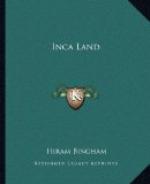Before dark the neighbors came to call, and we tried our best to persuade the men to accompany us up the mountain and help to carry the loads from the point where the mules would have to stop; but they declined absolutely and positively. I think one of the men might have gone, but as soon as his quiet, well-behaved wife saw him wavering she broke out in a torrent of violent denunciation, telling him the mountain would “eat him up” and that unless he wanted to go to heaven before his time he had better let well enough alone and stay where he was. Cieza de Leon, one of the most careful of the early chroniclers (1550), says that at Coropuna “the devil” talks “more freely” than usual. “For some secret reason known to God, it is said that devils walk visibly about in that place, and that the Indians see them and are much terrified. I have also heard that these devils have appeared to Christians in the form of Indians.” Perhaps the voluble housewife was herself one of the famous Coropuna devils. She certainly talked “more freely” than usual. Or possibly she thought that the Coropuna “devils” were now appearing to Indians “in the form of” Christians! Anyhow the Indians said that on top of Coropuna there was a delightful, warm paradise containing beautiful flowers, luscious fruits, parrots of brilliant plumage, macaws, and even monkeys, those faithful denizens of hot climates. The souls of the departed stop to rest and enjoy themselves in this charming spot on their upward flight. Like most primitive people who live near snow-capped mountains, they had an abject terror of the forbidding summits and the snowstorms that seem to come down from them. Probably the Indians hope to propitiate the demons who dwell on the mountain tops by inventing charming stories relating to their abode. It is interesting to learn that in the neighboring hamlet of Pampacolca, the great explorer Raimondi, in 1865, found the natives “exiled from the civilized world, still preserving their primitive customs... carrying idols to the slopes of the great snow mountain Coropuna, and there offering them as a sacrifice.” Apparently the mountain still inspires fear in the hearts of all those who live near it.
The fact that we agreed to pay in advance unheard-of wages, ten times the usual amount earned by laborers in this vicinity, that we added offers of the precious coca leaves, the greatly-to-be-desired “fire-water,” the rarely seen tobacco, and other good things usually coveted by Peruvian highlanders, had no effect in the face of the terrors of the mountain. They knew only too well that snow-blindness was one of the least of ills to be encountered; while the advantages of dark-colored glasses, warm clothes, kerosene stoves, and plenty of good food, which we freely offered, were far too remote from the realm of credible possibilities. Professor Coello understood all these matters perfectly and, being able to speak Quichua, the language of our prospective carriers, did his best in the way of




